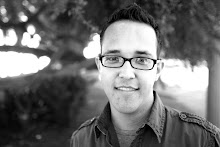It turns out that it's a really good thing that I don't have any opponents ripping apart my every sentence. If I were to be rhetorically torn limb from limb, two things would become aparent very quickly: (1) I am probably a blabbering idiot and (2) it is likely that my glasses aren't strong enough because I seem to have some serious vision problems. The first of those revelations may or may not be true, but there's nothing I can do about it either way so I'll just let it be. The second one, however, is really what I want to get at.
With all my talk about God's latency* (i.e., God being hidden and uncertain), it would be a very reasonable thing to ask whether I can really see straight. Throughout my life I have met a good number of people who know God is there and have seen God act in their lives. I've met many people who talk about God as though God is as concrete as a desk or a car. For them, God is not followed by a question mark but by a period.
And they would be right to question my vision. After all, the entire concept of a latent God is centered around my inability to see. Although this criticism does not come as a surprise to me (heck, it's basically built in), it still makes me uneasy from time to time.
I know that God is not so clear for everyone. I've met many people (even Christians!) who readily admit that they don't see God. Nonetheless, I sometimes fear that the fact that I can't see means that there is something wrong with me.
Perhaps I'm blind....
*[Since it's been a while, here's a quick refresher: To say that God is latent is to say that God exists as potential. It's the idea that God seems about to burst into the world with unmistakable power—but that it hasn't happened yet and there is no way to prove anything one way or the other. The latency of God is what makes people doubt and what causes people to believe (as opposed to know). It means that we are forced to live in this strange almost-but-not-quite world where God is hidden from view.]


Matt, what if your inability to see is another aspect of what it means to see God? And, is it possible for all those who claim quite adamantly that they see God that they could either be seeing various aspects of what God might be like through the finite and particular lenses with which they see, or that they could be potentially mistaken about what they are seeing because of their lack of the awareness of what condition their lenses are in? I'm not quite sure of how to handle other people's illuminations because many of them state that theirs is the only possible way of seeing, all the while there is someone around the corner stating with as much certitude that their own experience is the only way to perceive reality. This causes me to ponder as to whether we humans are all that alike or not. Personally, I am becoming more comfortable with the questions and my inability to answer them (at least to other's satisfaction, that is) because it is so difficult for me to latch onto the many possible answers posited to me by others. Interestingly, for those many that can't even agree amongst themselves, they would seem to support one another in all their divesity while condemning me for saying "I'm not sure." Maybe the problem lies deeper within the human personality than it does in terms of what we say "is so."
ReplyDeleteWhen I step back from things a bit, it is easy for me to lean on subjectivity and qualify the things people say as "through their own lens." What is difficult for me, though, is when these sort of ideas cross over into the context of my personal life.
ReplyDeleteIt isn't to hard for me to hold the line when I consider opposing ideas in an abstract way. But when opposing ideas come out of the mouths of people I know and trust, it all becomes much harder. Since I'm still exploring (and really haven't even reached any temporary conclusions), I guess I tend to be a little unsure of myself.
But still I'll press on....